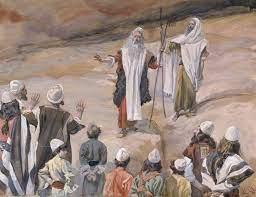Echoes Elsewhere in Numbers

The story of Korah, Dathan, and Abiram (to see link click Cn – Korah’s Rebellion) resonates in several ways with other portions of the book of Numbers. Our teaching of the mitzvah in Numbers 15 already noted several connections with Korah’s rebellion in Chapter 16, such as ADONAI speaking only through Moshe (15:1-21), the priest making atonement for the whole community of the people of Isra’el (15:25), anyone who sins defiantly (15:30) as being the cause of Korah’s rebellion. Korah’s status as a Levite and a member of the clan of Kohath (see At – The Clan of Kohath) brings us back to the picture of total obedience and careful order in the arrangement of the camp (see Am – The Camp of the Twelve Tribes of Isra’el) and the assigned duties surrounding the Tabernacle in Numbers Chapters 2 through 4. The Levites special status as the tribe closest to the Tabernacle should have brought joy and fulfillment to them, but in Chapter 16, Korah wanted the full privilege and responsibility of the high priest (16:3 and 8-11). His rebellion continued the trouble in the holy camp which had begun in the spy story (see Bv – The Sin of Kadesh-barnea) of Numbers 13 and 14. In the spy story, the rebels claimed that the land of Canaan devoured its inhabitants (13:32), a lie that caused the people to rebel against going into the Promised Land. Now, in Numbers 16, what Isra’el feared in Canaan became a reality in the desert as Ha’Shem opened up the ground and swallowed Korah and his followers alive (16:31-33).
Rebellion over authority and jealousy have appeared earlier in Numbers. Aaron himself, along with Miryam had challenged Moshe’s authority with a question quite similar to Korah’s when they said: Has ADONAI spoken only through Moses? Has He not spoken through us also” (12:2)? Aaron found himself on the other side of that question when Korah and his conspirators asked: After all, the entire community is holy, every one of them . . . So why do you lift yourselves up above ADONAI’s assembly” (16:3)? The message of Korah’s rebellion is that certain functions associated with the holy Tabernacle and leadership of the nation of Isra’el should be performed only by those leaders and priests whom ADONAI has chosen and commissioned. Yet, those leaders were not perfect; Aaron in his rebellion against Moses is one example (see Bu – The Rebellion of Miryam and Aaron). Moreover, at times Moshe welcomed guidance from outside divinely chosen channels like Hobab the Midianite (10:29-32) and the prophesying in the camp by Eldad and Medad (11:26-30).
Thus, the total witness of Numbers suggests that the Church ought to honor their leaders and respect certain divisions of ministry between lay people and ordained Messianic rabbis and pastors. But lay leaders also need to be open to their own sinfulness and to listen to other mature believers for wisdom and guidance. Problems, whether among leaders or followers arise when envy, self-exaltation and personal attack take over from a genuine concern for obedience to God’s will and the well-being of the entire community.
As we return to the context of the story and development of the book of Numbers, the rebellion of Korah, Dathan, Abiram, the 250 lay leaders, and finally the whole congregation suggests a spreading out and extension of the spirit of rebellion among the members of the old Exodus generation. In spite of the interruption of the additional mitzvot in Numbers 15 (see Cg – A Whisper of Hope: Reassurance for Life in the Promised Land), the old Exodus generation had continued its downward spiral into ongoing rebellion, disintegration as a community, and despising God and God’s gifts of the Land, God’s mitzvot, and God’s chosen leaders. Are there ways by which Aaron’s privilege as priest can be visually established into the minds of the Israelites? Does Isra’el need a review of the rights and responsibilities of the priesthood and the role of the Levites? These questions form the basis for the next two chapters, Numbers 17 and 18, in which the issue of Aaron’s claim to the priesthood and the functions of the priests and Levites will be given more detailed attention. This may have helped preserve the lives of the Exodus generation for many years, although their eventual death sentence was just a matter of time, since Ha’Shem swore it with an oath (see Cr – The Response of God: The oath of God). But equally binding were God’s eternal promises which were then given to the wilderness generation who grew up in the desert even as their parents were dropping dead into the sand (Numbers 14:31, 15:2, 18 and 41).337



Leave A Comment